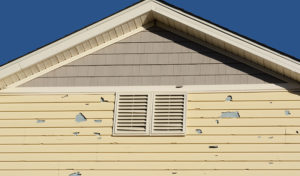Is Homeowner Insurance Covered Under HOA Insurance?

Insurance can be a tricky subject to navigate, especially when you own a home in a community operated by an HOA. As a homeowner, do you need homeowner insurance if your HOA already has a master policy? Let's find out.
Browse By Category
Sign up for Our Newsletter
Insurance can be a tricky subject to navigate, especially when you own a home in a community operated by an HOA. As a homeowner, do you need homeowner insurance if your HOA already has a master policy? Let’s find out.
What Is the Difference Between Homeowner Insurance and HOA Insurance?
While both homeowners insurance and HOA insurance offer protection, they are not one and the same. The key difference between these two types of insurance is what they cover. Homeowner insurance typically applies to the property and personal belongings of the homeowner, whereas HOA insurance applies to the property and liability of the homeowners association.
As for who pays for these policies, the answer is the homeowner. As a homeowner, you pay for your own homeowners insurance policy, as it covers your individual dwelling. HOA insurance is also paid for by the homeowners who live in the community. Homeowners have a financial obligation to pay monthly dues to the association. The HOA then uses these dues to fund the various expenses of the association, which can include insurance premiums, among other things.
What Does Homeowners Insurance Cover?
Homeowner insurance offers financial protection for dwelling and personal property damage in the event of a covered peril. Covered perils can vary from one provider to another, with the location of the home playing a key role in the policy. Most standard homeowners insurance policies, though, offer coverage for the following risks:
 Fire and smoke
Fire and smoke- Wind or hail storms
- Frozen plumbing
- Falling objects
- Water damage as a result of plumbing, HVAC systems, and appliances
- Theft
Homeowner insurance also provides liability protection. For example, if you or a family member cause bodily injury or property damage to a third party, homeowners insurance can offer coverage for lawsuits and damages. In general, homeowners insurance doesn’t cover floods or earthquakes. For those risks, you will typically need to purchase a separate or additional policy.
When it comes to coverage levels, homeowners insurance comes in three forms: actual cash value (ACV), replacement cost, and guaranteed replacement cost or value. Actual cash value pays you the amount after factoring in depreciation, whereas replacement cost covers the full cost of replacement without depreciation. Finally, guaranteed replacement cost or value covers the total cost even if it goes beyond your policy limit (usually up to 20-25% over the limit). Therefore, it is the most comprehensive.
What Does HOA Insurance Cover?
Unlike homeowners insurance, which is meant to cover an individual homeowner’s property, HOA insurance covers communal property. This policy protects the common areas and buildings of a homeowners association.
A standard HOA master policy includes coverage for the following items:
- Property Damage. HOA insurance can pay for the cost of repairs in the event common elements suffer damage due to a covered peril.
- Liability. If a guest becomes injured on HOA property, the master policy can cover the cost of legal and medical fees.
As with homeowner insurance, HOA insurance can vary in terms of covered risks. Again, location can play an important role in determining what is covered.
Homeowners Insurance vs Condo Insurance
It is easier to define and insure the common areas in homeowners associations consisting of detached homes. But, in condo associations where a lot of elements are shared, the distinction isn’t always so clear-cut. As such, condo insurance typically comes in three forms:
- Bare-walls Coverage. This covers the structure itself, along with the wiring, plumbing, and insulation of an owner’s condo unit.
- All-in Coverage. This offers bare-walls coverage but with added protection for appliances, countertops, and other built-in items.
- Special Entity Coverage. This covers all property inside individual condo units but not structural modifications or additions.
As with HOA and homeowners insurance, condo owners best purchase their own individual condo insurance. First, owners should find out what their condo master policy already covers. This will help them make a decision on what policy to buy for themselves. Just like homeowners insurance, personal condo insurance offers coverage for liability as well as personal items.
How Much Does Homeowner Insurance Cost?
The cost of homeowners insurance will depend on a number of factors. These include your location, your home value, the condition and age of your home, the coverage amount, and the provider you choose. For instance, homeowners living in areas with a high crime rate generally have to pay more for home insurance due to the higher chance of theft. Additional coverage or “riders” can also affect the cost of your insurance premium.
On average, though, homeowners pay somewhere between $1,300 to $1,700 per year for home insurance. While the cost may seem expensive at first glance, it’s basically nothing compared to the expenses you will incur to repair a damaged home or pay for liability. As such, homeowners insurance is definitely a good investment to make.
How to Get Homeowners Insurance
 When looking for homeowners insurance, the first thing you need to do is determine your needs. What is it that you want to cover? And how much coverage do you need? This will, of course, require some calculations on your part. Determine how much it will cost to rebuild your home, and don’t forget to include the cost of your personal belongings, too. In doing so, you can set a realistic coverage amount.
When looking for homeowners insurance, the first thing you need to do is determine your needs. What is it that you want to cover? And how much coverage do you need? This will, of course, require some calculations on your part. Determine how much it will cost to rebuild your home, and don’t forget to include the cost of your personal belongings, too. In doing so, you can set a realistic coverage amount.
Next, shop around. Looking for the right homeowner insurance company takes work. And while you will find many online, don’t go with just the first or cheapest one. Cheap homeowners insurance does exist, but such policies usually don’t provide sufficient coverage. To better compare your prospects, ask each company to provide you with a homeowner insurance quote.
It’s also a good idea to do some research on every candidate. Look for online reviews and references. See what other customers have to say about their services and claims process. Some companies make customers jump through hoops just to get a single claim approved. You don’t want that.
After gathering enough data, it’s time to make your choice. Keep in mind that, in the end, the best homeowners insurance is the one that fits your needs and standards.
Do I Need Homeowner Insurance?
Homeowners insurance is something that no homeowner should leave out. Even if your association already has an HOA master policy, you will still need a separate policy of your own. After all, HOA insurance normally doesn’t cover individual homes or condos — only common elements and areas.
Managing a homeowners association comes with a lot of responsibilities, including staying on top of HOA insurance. Get help from a reputable HOA management company today. Start your search using our online directory!
RELATED ARTICLES:
- Can A Homeowner Benefit From Property And Casualty Insurance?
- Does Your Association Need HOA Workers’ Comp Insurance?
- Are You An HOA Board Member? Here’s Why You Need HOA Directors And Officers Insurance
Trending Now
Related Article
Sign up for Our Monthly Newsletter
Sign up below for monthly updates on all HOA Resource
















